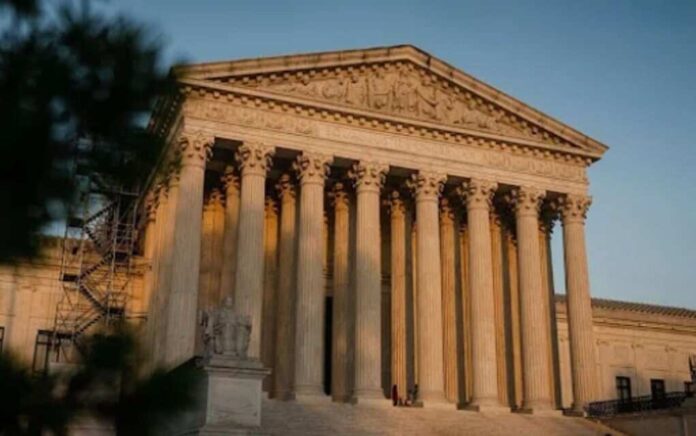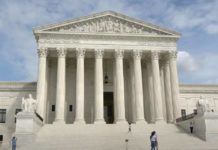
President Biden has a massive decision to make. But the Supreme Court might make it for him.
Because the Supreme Court controls Joe Biden’s future in this critical way.
Many legal experts have endorsed the Biden administration’s suggestion to invoke the 14th Amendment to win the debt ceiling dispute, but some have expressed concern about unintended effects that would necessitate a review by the Supreme Court.
After learning that President Joe Biden’s advisors were considering raising the debt ceiling because the nation could default on its debts as early as June 1, speculation about how the constitutional amendment that helped free the slaves and enshrined “equal protection under the laws” would be relevant to Democrats’ desire to do raise the debt ceiling erupted last week.
The 14th Amendment’s Section 4 declares that “The validity of the public debt of the United States, authorized by law… shall not be questioned.” This clause was passed during the Civil War. According to some experts, notably Harvard Law professor Laurence Tribe, Section 4 gives the president the power to command the payment of the nation’s debts regardless of the debt ceiling Congress set up more than a century ago.
“That’s the argument that’s being made in a lawsuit filed last week by the National Association of Government Employees,” Tribe said on Monday to the Harvard Gazette. “They are asking for a declaration that the debt ceiling is unconstitutional and unenforceable and an injunction against enforcing it.”
Tribe asserted that while he wouldn’t “advise” Biden to bring his own action, the high court may ultimately decide to address the matter in the context of NAGE’s lawsuit if it so chose.
The justices could eventually hear the case “on behalf of civilian and military federal employees who plausibly allege that their jobs are in jeopardy because the executive branch has left open the possibility that it’ll treat the debt ceiling as binding on it,” Tribe said.
A partner at Harris Beach who has appeared before a federal appeals court more than 20 times, Brian Ginsberg, told the reporters, “That theory is wrong,” in reference to the idea that Section 4 might somehow supersede Congress’s command of the purse.
“And the reason is that the phrase ‘approved by law’ in Section 4 is there. Only debt that is “authorized by law” is considered to be “unquestionable,” according to Ginsberg.
Legal experts who disagree, such as Ginsberg, have suggested that going above the cap imposed by Congress would be an unprecedented action that would exacerbate an already serious constitutional quandary.
If the president were permitted to “unilaterally exceed the congressionally authorized debt limit,” Ginsberg added, a door would be left open to a “great deal of mischief.”
A Supreme Court review, however, would not be assured, according to experts.
Jonathan Adler, a professor at Case Western Reserve University’s law school, told the media that he thinks the “real question” is “whether bond markets would accept it or not.”
According to Adler, the executive branch has considerable immunity from litigation, thus it is unclear who would have “basis for standing,” or the capacity to file a lawsuit, if Biden chose to rely on the 14th Amendment to circumvent Congress’s debt ceiling.
Ginsberg further said that it “would be difficult to think of a person or entity who was uniquely affected in some more individualized way” and that a judge would probably reject the case because it raises a “political question.”
Legal experts told the Washington Examiner that despite threats of lawsuits, the Supreme Court may attempt to steer clear of the matter entirely since the ongoing disputes over the debt ceiling have always boiled down to political issues, which is likely to keep the justices as far away as possible.
The justices would also be cautious about causing any significant economic instability.
But Biden conceded last week that the theory “would have to be litigated” if it were to be used.
Should the administration use the 14th Amendment to circumvent Congress’ impasse on raising the debt ceiling before a June 1 deadline, Adler said any legal challenge is not “clear” at this time.
If we take the matter to court, “it’s not clear what the suit would be, certainly not on a time frame that the court would be likely to resolve,” Adler added.
The arguments that the executive branch might essentially circumvent the debt ceiling, however, are rather brazen and have been explored and rejected for years, according to Adler.
It is unclear if Biden will try to end the deadlock in Congress over the debt ceiling by invoking the 14th Amendment. Additionally, it is “legally questionable whether or not that is a viable strategy,” according to Treasury Secretary Janet Yellen.
The Supreme Court just might be forced to handle this legal question that looms over the federal government right now.
Stay tuned to the Federalist Wire.



















